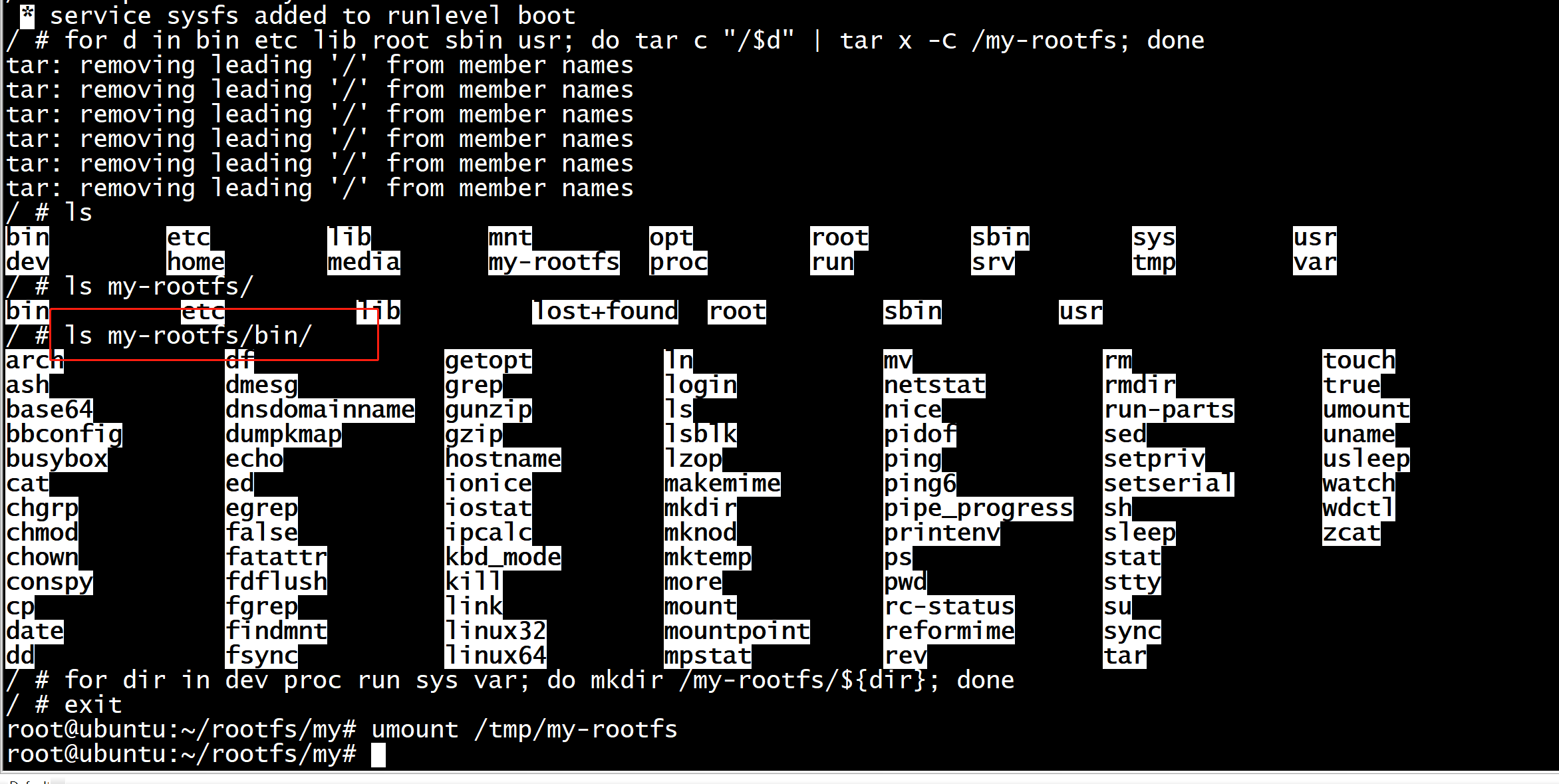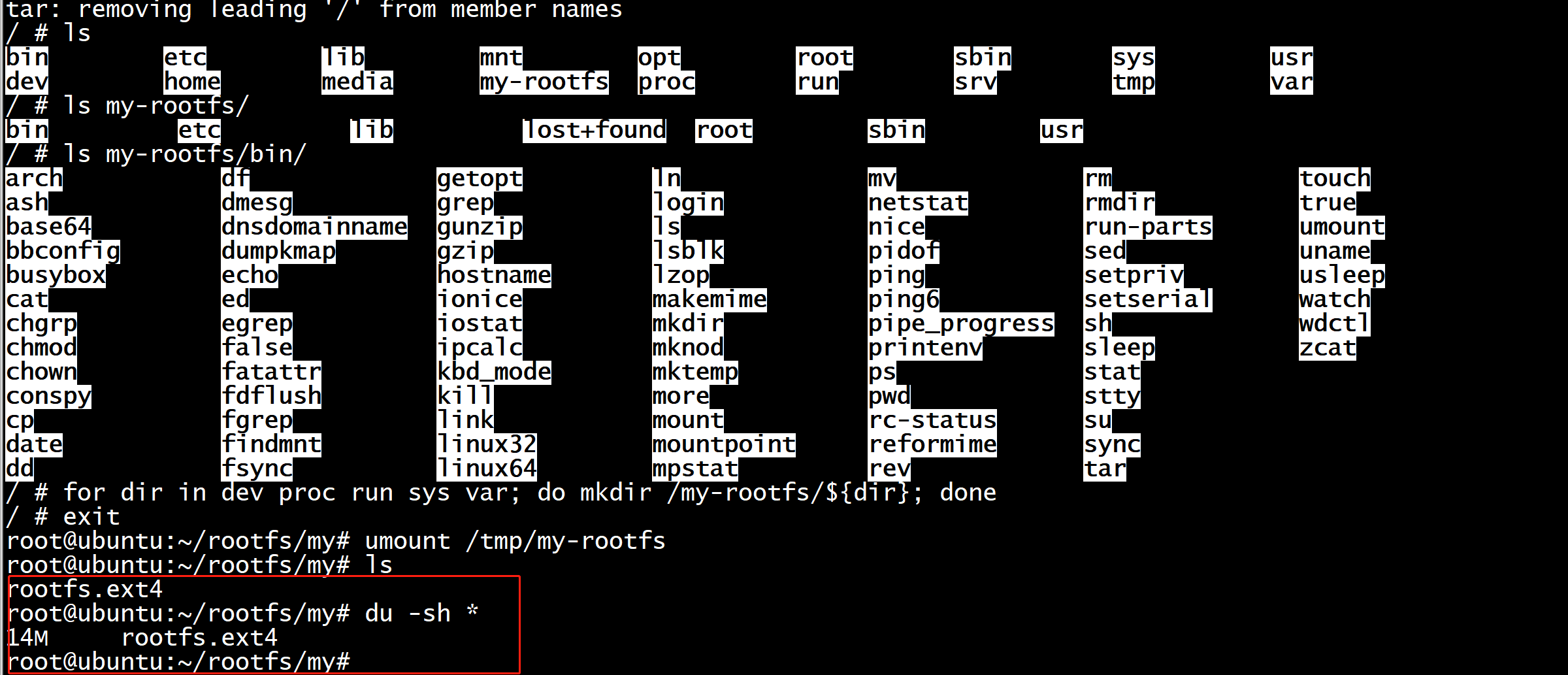Creating Custom rootfs and kernel Images
Creating a kernel Image
Currently, Firecracker supports only uncompressed, ELF kernel images. You can build an uncompressed Linux kernel image with:
make vmlinux
Here's a quick step-by-step guide to building your own kernel that Firecracker can boot:
-
Get the Linux source code:
git clone https://github.com/torvalds/linux.git linux.git cd linux.git -
Check out the Linux version you want to build (e.g. we'll be using v4.20 here):
git checkout v4.20
-
You will need to configure your Linux build. You can start from our recommended config - just copy it to
.config(under the Linux sources dir). You can make interactive config adjustments using:make menuconfig
Note: there are many ways of building a kernel config file, other than
menuconfig. You are free to use whichever one you choose. -
Build the uncompressed kernel image:
make vmlinux
-
Upon a successful build, you can find the uncompressed kernel image under
./vmlinux.
Creating a rootfs Image
A rootfs image is just a file system image, that hosts at least an init system. For instance, our getting started guide uses an EXT4 FS image with OpenRC as an init system. Note that, whichever file system you choose to use, support for it will have to be compiled into the kernel, so it can be mounted at boot time.
To build an EXT4 image:
-
Prepare a properly-sized file. We'll use 50MiB here, but this depends on how much data you'll want to fit inside:
dd if=/dev/zero of=rootfs.ext4 bs=1M count=50
-
Create an empty file system on the file you created:
mkfs.ext4 rootfs.ext4
You now have an empty EXT4 image in rootfs.ext4, so let's prepare to populate it. First, you'll need to mount this new file system, so you can easily access its contents:
mkdir /tmp/my-rootfs
sudo mount rootfs.ext4 /tmp/my-rootfs
The minimal init system would be just an ELF binary, placed at /sbin/init. The final step in the Linux boot process executes /sbin/init and expects it to never exit. More complex init systems build on top of this, providing service configuration files, startup / shutdown scripts for various services, and many other features.
For the sake of simplicity, let's set up an Alpine-based rootfs, with OpenRC as an init system. To that end, we'll use the official Docker image for Alpine Linux:
-
First, let's start the Alpine container, bind-mounting the EXT4 image created earlier, to
/my-rootfs:docker run -it --rm -v /tmp/my-rootfs:/my-rootfs alpine
-
Then, inside the container, install the OpenRC init system, and some basic tools:
apk add openrc apk add util-linux
-
And set up userspace init (still inside the container shell):
# Set up a login terminal on the serial console (ttyS0): ln -s agetty /etc/init.d/agetty.ttyS0 echo ttyS0 > /etc/securetty rc-update add agetty.ttyS0 default # Make sure special file systems are mounted on boot: rc-update add devfs boot rc-update add procfs boot rc-update add sysfs boot # Then, copy the newly configured system to the rootfs image: for d in bin etc lib root sbin usr; do tar c "/$d" | tar x -C /my-rootfs; done for dir in dev proc run sys var; do mkdir /my-rootfs/${dir}; done # All done, exit docker shell exit -
Finally, unmount your rootfs image:
sudo umount /tmp/my-rootfs
You should now have a kernel image (vmlinux) and a rootfs image (rootfs.ext4), that you can boot with Firecracker.
root@ubuntu:~/rootfs/my# dd if=/dev/zero of=rootfs.ext4 bs=1M count=50 50+0 records in 50+0 records out 52428800 bytes (52 MB, 50 MiB) copied, 0.080313 s, 653 MB/s root@ubuntu:~/rootfs/my# ls rootfs.ext4 root@ubuntu:~/rootfs/my# mkfs.ext4 rootfs.ext4 mke2fs 1.44.1 (24-Mar-2018) Discarding device blocks: done Creating filesystem with 51200 1k blocks and 12824 inodes Filesystem UUID: 06211353-f960-45df-a7a4-f0b2c2e3bebf Superblock backups stored on blocks: 8193, 24577, 40961 Allocating group tables: done Writing inode tables: done Creating journal (4096 blocks): done Writing superblocks and filesystem accounting information: done root@ubuntu:~/rootfs/my# mkdir /tmp/my-rootfs root@ubuntu:~/rootfs/my# mount rootfs.ext4 /tmp/my-rootfs root@ubuntu:~/rootfs/my# docker run -it --rm -v /tmp/my-rootfs:/my-rootfs alpine


root@ubuntu:~/rootfs/my# docker run -it --rm -v /tmp/my-rootfs:/my-rootfs alpine / # apk add openrc fetch http://dl-cdn.alpinelinux.org/alpine/v3.12/main/aarch64/APKINDEX.tar.gz fetch http://dl-cdn.alpinelinux.org/alpine/v3.12/community/aarch64/APKINDEX.tar.gz (1/1) Installing openrc (0.42.1-r11) Executing openrc-0.42.1-r11.post-install Executing busybox-1.31.1-r16.trigger OK: 8 MiB in 15 packages / # apk add util-linux (1/17) Installing libblkid (2.35.2-r0) (2/17) Installing blkid (2.35.2-r0) (3/17) Installing libcap-ng (0.7.10-r1) (4/17) Installing setpriv (2.35.2-r0) (5/17) Installing libmount (2.35.2-r0) (6/17) Installing libsmartcols (2.35.2-r0) (7/17) Installing findmnt (2.35.2-r0) (8/17) Installing mcookie (2.35.2-r0) (9/17) Installing ncurses-terminfo-base (6.2_p20200523-r0) (10/17) Installing ncurses-libs (6.2_p20200523-r0) (11/17) Installing hexdump (2.35.2-r0) (12/17) Installing lsblk (2.35.2-r0) (13/17) Installing libuuid (2.35.2-r0) (14/17) Installing libfdisk (2.35.2-r0) (15/17) Installing sfdisk (2.35.2-r0) (16/17) Installing cfdisk (2.35.2-r0) (17/17) Installing util-linux (2.35.2-r0) Executing busybox-1.31.1-r16.trigger OK: 14 MiB in 32 packages / #
OK: 14 MiB in 32 packages / # ln -s agetty /etc/init.d/agetty.ttyS0 / # echo ttyS0 > /etc/securetty / # rc-update add agetty.ttyS0 default * service agetty.ttyS0 added to runlevel default / # rc-update add devfs boot * service devfs added to runlevel boot / # rc-update add procfs boot * service procfs added to runlevel boot / # rc-update add sysfs boot * service sysfs added to runlevel boot / # for d in bin etc lib root sbin usr; do tar c "/$d" | tar x -C /my-rootfs; done tar: removing leading '/' from member names tar: removing leading '/' from member names tar: removing leading '/' from member names tar: removing leading '/' from member names tar: removing leading '/' from member names tar: removing leading '/' from member names / # ls bin etc lib mnt opt root sbin sys usr dev home media my-rootfs proc run srv tmp var / # ls my-rootfs/ bin etc lib lost+found root sbin usr / # ls my-rootfs/bin/ arch df getopt ln mv rm touch ash dmesg grep login netstat rmdir true base64 dnsdomainname gunzip ls nice run-parts umount bbconfig dumpkmap gzip lsblk pidof sed uname busybox echo hostname lzop ping setpriv usleep cat ed ionice makemime ping6 setserial watch chgrp egrep iostat mkdir pipe_progress sh wdctl chmod false ipcalc mknod printenv sleep zcat chown fatattr kbd_mode mktemp ps stat conspy fdflush kill more pwd stty cp fgrep link mount rc-status su date findmnt linux32 mountpoint reformime sync dd fsync linux64 mpstat rev tar / #


root@ubuntu:~# chroot /mnt /bin/bash chroot /mnt /bin/bash chroot: failed to run command ‘/bin/bash’: No such file or directory
修改 密码
cp -av /lib/aarch64-linux-gnu/ld-2.27.so /tmp/my-rootfs/lib/aarch64-linux-gnu
root@ubuntu:~# ldd /tmp/my-rootfs/bin/bash ldd /tmp/my-rootfs/bin/bash linux-vdso.so.1 (0x0000ffffb51d5000) libtinfo.so.5 => /lib/aarch64-linux-gnu/libtinfo.so.5 (0x0000ffffb5059000) libdl.so.2 => /lib/aarch64-linux-gnu/libdl.so.2 (0x0000ffffb5044000) libc.so.6 => /lib/aarch64-linux-gnu/libc.so.6 (0x0000ffffb4eea000) /lib/ld-linux-aarch64.so.1 (0x0000ffffb51aa000)
root@ubuntu:~# ls /lib/ld-linux-aarch64.so.1 -al ls /lib/ld-linux-aarch64.so.1 -al lrwxrwxrwx 1 root root 28 Jun 5 01:25 /lib/ld-linux-aarch64.so.1 -> aarch64-linux-gnu/ld-2.27.so
root@ubuntu:/home/ubuntu# for i in `ldd /bin/bash`;do echo $i;done |grep -v = |grep -v 0x |grep /|xargs ls -l lrwxrwxrwx 1 root root 12 Jun 5 01:25 /lib/aarch64-linux-gnu/libc.so.6 -> libc-2.27.so lrwxrwxrwx 1 root root 13 Jun 5 01:25 /lib/aarch64-linux-gnu/libdl.so.2 -> libdl-2.27.so lrwxrwxrwx 1 root root 15 Sep 24 17:53 /lib/aarch64-linux-gnu/libtinfo.so.5 -> libtinfo.so.5.9 lrwxrwxrwx 1 root root 28 Jun 5 01:25 /lib/ld-linux-aarch64.so.1 -> aarch64-linux-gnu/ld-2.27.so root@ubuntu:/home/ubuntu#
root@ubuntu:~# chroot /tmp/my-rootfs chroot /tmp/my-rootfs bash-4.4#